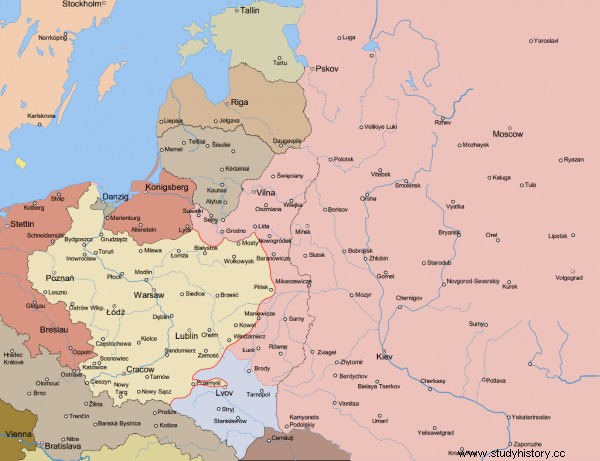The war between the Second Polish Republic and Soviet Russia has never been declared, so it is not easy to determine exactly when it began. Until recently, it was assumed that the conflict broke out on February 14, 1919. Recent studies, however, point to the first days of January. Jerzy Borzęcki recently provided new arguments in this matter.
The date on February 14, 1919 was related to the clashes between the Polish Army and the Red Army in western Belarus. In 2009, Waldemar Rezmer published an article in which he argued that the fighting began on January 4 with the Soviet attack on Vilnius . Not all historians were convinced then. As Jerzy Borzęcki writes in one of the recent editions of "Dzieje Latest":
It seems that the only reason the very well-documented Rezmer article may not fully convince someone is that the author is dealing with the issue only from a military perspective. Meanwhile, it is widely accepted after Clausewitz that war is an extension of politics by other means.

What did the Bolsheviks go with? (il. public domain).
Save Vilnius!
The quoted historian therefore undertook the analysis of the events of January 1919 from the political point of view. He points out that the Bolsheviks had already in October 1918 developed a plan of attacking the areas in Central Europe that had been occupied by the Germans to be able to support the revolution in the Reich. The shortest route led through Lithuania and Vilnius to East Prussia. So the goals of Soviet Russia are clear.
As the Red Army was approaching Vilnius, Polish self-defense began to emerge in that city. It was necessary because the Polish Army in the central areas of the Commonwealth was cut off from the Vilnius Region by German troops. The command over the new formations in the former capital of the Grand Duchy of Lithuania was assumed by Władysław Wejtko, appointed by the Chief of the General Staff in Warsaw.
On December 8, 1918, the Vilnius self-defense units were officially included in the Polish Army, and the government in Warsaw gave them money for pay and the purchase of weapons. There were also promises to quickly send substantial reinforcements, which clearly indicates the political will to defend the city even if it meant a big battle and therefore the beginning of a war.

The news is based on a scientific article published in the periodical "Dzieje Latest".
Casus belli
In December 1918, the Polish authorities in Warsaw conducted intensive negotiations with the Germans to allow the transport of reinforcements to Vilnius and the sale of weapons and ammunition to its defenders. Unfortunately, these talks ended in a fiasco, despite pressure on Berlin from the French Marshal Ferdinand Foch. Moreover, as Jerzy Borzęcki writes, on December 29 Polish Minister of Foreign Affairs Leon Wasilewski:
sent a note to the People's Commissar for Foreign Affairs, Georgy Chicherin. In it, he warned that Poland would not hesitate to defend Vilnius before the war. He pointed out that " part of the territories [of Lithuania and Belarus] is indisputably Polish "And therefore a Soviet" invasion "of it would constitute" a direct attack on the vital interests of the Polish nation. " [...] Wasilewski's note did not name Vilnius by name, but it clearly implied that Poland would treat the attack on the city as casus belli .

The situation on the Polish-Bolshevik front in March 1919, before Vilnius was recaptured by the Polish Army. The remaining limits are as of their final determination (Fig. Halibutt &Hierakares, CC BY-SA 3.0).
On January 1, the German army left Vilnius, and the Lithuanian government (Taryba) left for Kaunas. On January 3, the Red Army struck the city and captured it on January 5. The fact that this gave rise to the Polish-Bolshevik war is also evidenced by the Polish position during the negotiations before the Riga peace.
A group of Polish delegates said then that the conflict did not begin with Piłsudski's Kiev expedition, but precisely when the Bolsheviks took over Vilnius. So it's probably about time to move the "official" date from February 14th to the beginning of January.
The source of the above news is:
Jerzy Borzęcki, When did the Polish-Soviet war of 1919–1920 start? Considerations from the political and military point of view , "History of the Latest", pp. 44 (2013), No. 3, pp. 25-37.
Historical news. What's the matter?
 | The "historical news" column is the latest news from the world of history. We are looking for missed and concealed discoveries of Polish (and not only) scientists. We show that there is always something going on in research on the past. |
 | Our news is short and accessible. On 2-3 thousand signs, we will summarize for you the discoveries that scientists have made on dozens of pages of hermetic works. We only write about what really matters. No boring. |
 | We rely on scientific publications from the last 18 months . In the world of history, news spreads slowly, and academic works reach potential recipients with a long delay. What in other fields ceases to be news after 24 hours in history may be even a year later. |
 | When preparing news, we follow the list of the most prestigious historical periodicals. If you are a publisher or author and would like us to reach for a specific publication - please send it to our editorial office. |
